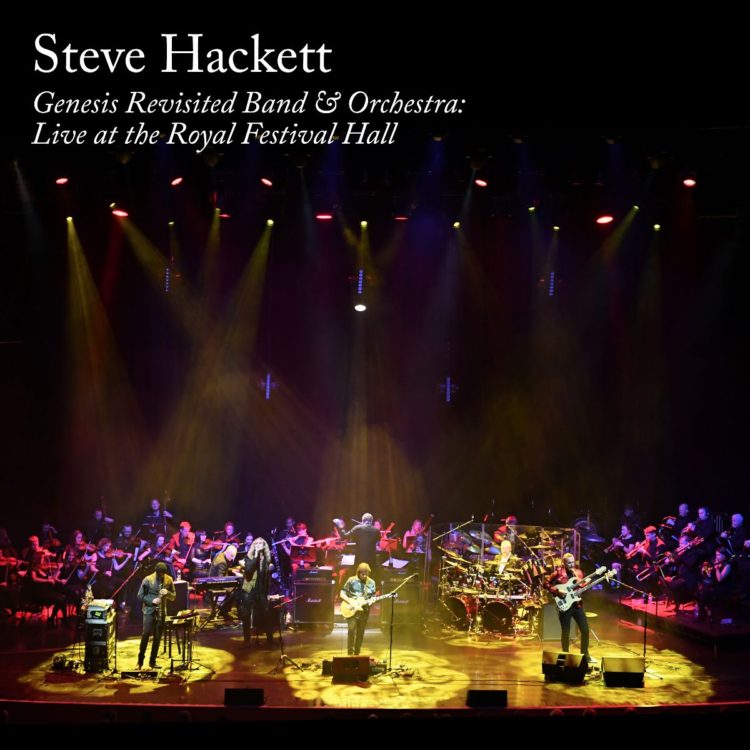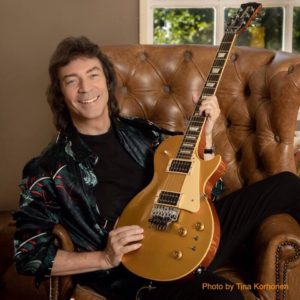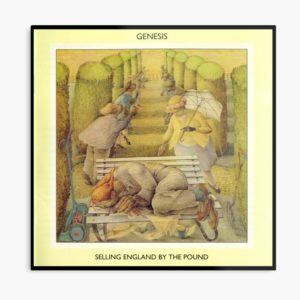
After a career that has spanned five decades, which has included a lauded and legendary stint with one of the most important and successful prog-rock bands of all time, a diverse and dynamic catalogue of 25 solo albums and a seemingly endless number of compositional collaborations, one might think that UK guitar icon Steve Hackett would be at a place in his life where he might want to slow down, reflect back on his remarkable career, and cut back on touring, writing and recording.
But judging by his continued output over the last few years, there is no doubt that Hackett continues to be at the top of his creative game, releasing scintillating albums of original material regularly, touring the globe and capturing some of he and his solo band’s best performances for posterity on DVD and CD.
Less than a year after releasing his most recent solo opus, At the Edge of Light, Hackett is set to issue Genesis Revisited Band & Orchestra: Live at the Festival Hall, on DVD and CD on Oct. 25 worldwide through InsideOutMusic. It captures a stellar performance that took place on Oct. 5, 2018 at the London, U.K. venue, and features some of the most significant early-catalogue Genesis songs alongside a host of Hackett’s own venerable material.
Doing a live album and DVD is a monumental logistical and creative task already, not to mention sometimes prohibitively expensive because of all the extra sound and lighting gear and booking a top notch venue. Adding the diverse complexities of incorporating a full orchestra into the mix and it could be a recipe in the very least for a lot of headaches.
“It’s a huge risk and everybody know that. It’s always going to be a huge financial risk, but you’ve got to have a dream and a vision and build a good team around that vision. In this case, the positives outweighed the negatives and I think the product that will be released on Oct. 25, well, the proof is in the pudding. The orchestra sounds like the crack regiment that they are, and my band was having an incredible evening as well. And the Royal Festival Hall is a great London venue, it’s terrific. So, I am really proud of the whole endeavour,” said Hackett.
For the new live album, Hackett and his regular live band worked alongside the Heart of England Orchestra, which was conducted by Bradley Thachuk, whose main gig is as the primary conductor and Music Director for the Niagara Symphony Orchestra, as well as subbing in with other orchestras in both the U.S. and Canada.
“I have worked with orchestras several times. In the mid-1990s I did the first Genesis Revisited albums with tracks such as Watcher of the Skies and Firth of Fifth and we had the Royal Philharmonic Orchestra on that, and it went very, very well indeed. We went back to the mellotrons and synths but also augmented now by the real thing, which was extraordinary. And it was a fabulous orchestra who I also worked with on my Midsummer Night’s Dream project,” Hackett explained.
“I was working with orchestras in Germany, and indeed I will be working with one next year, and I have always worked with two separate orchestras in Iceland. A couple of years back, we met Bradley Thachuk at a show in upstate New York. We were doing something in North Tonawanda, and he said he wanted to do something with us and an orchestra. I thought he was great, but didn’t think it was a serious offer, but it was. So, we did a show with him and the Buffalo Philharmonic and he was so enthusiastic and talented that we flew him over for the shows the we ended up taping for the new DVD.

“He and his brother Steven, who did many of the orchestral arrangements are both fans of mine and Genesis, and obviously Bradley is a thorough professional too. It’s funny, isn’t it, how many people who are in the classical world today working with orchestras, maybe some of their earlier influences were bands like Genesis and others that had some classical references in them. The nice thing about working with Bradley as a conductor is that he said he will follow me and my band in terms of tempo, which made things really so much easier. Sometimes what happens when you work with an orchestra live is that if you don’t catch the cue from the conductor as he is counting in the song, it can mess things up for everyone. Working like that is a complete about face for a rock band because it’s usually going to be the drummer or frontman counting everyone in. That was my main worry, but luckily, he was able to fit in with us and that’s why I like working with Brad a lot, because it means he’s got rock sensibilities, which makes our job easier.”
Hackett has always believed in the ability of music to transcend time and space, to break down barriers and to bring people of disparate backgrounds and upbringings together. He has deliberately sought out collaborations that cross genres, cultural and societal lines and desires to incorporate new sounds and the artists who create them into his repertoire. Such is the case with most of his recent studio albums, including 2017’s The Night Sire and At The Edge of Light, which was released earlier this year.
“Both of those albums had more than 20 people feature on them from all over the world. It was a United Nations approach to broaden rock’s shoulders to take on board other instruments and a world music aspect and the idea of fellowship and all that. It’s about having music do something that the politicians don’t seem to be able to do, which is to build bridges. The politicians are not doing that. I would say they are going to the gospel that’s currently being pounded on the table, which is nationalism at all costs. And we know where that all leads; it’s short sighted. Fortunately, music knows no borders and for me the bridge building is incredibly important,” said Hackett.
“Musicians want to work with each other. I am not going to not work with a Chinese guy because of his nation’s politics. Music doesn’t work like that. I had people from India on my last album, from Azerbaijan, from Iceland, the U.K., from Sweden, the United States and the list goes on. It’s an open invitation to the best in the world, rather that being merely local.
“Music is really the only universal language and you might as well exploit that to re-energize people and to heal and to, I think, move forward in a multi-cultural sense of the word without it being patronizing at all. And sometimes a style of music can be enlightening: it might not come down to a specific instrument but working with a guy like Malik Mansourov who plays guitar and is from Azerbaijan, he works in a form that I have never heard before. It’s almost like a style of Arabic jazz, called Mugham, which is common in that part of the world, as well as Turkey, Iran and Iraq. It’s like working with a guy who is a combination of Ravi Shankar and John McLaughlin. It’s especially fantastic working face to face. We were recording in Hungary and we had to communicate in a combination of sign language, Russian and French in order to work together, but no English. He wouldn’t know many of the bands that you and I know, but he will know other stuff and I want to be able to take that on board and, as I said, broaden what I do and keep the surprises coming.”
With that in mind, Hackett said he is already well into the writing process for a new album. He is trying to get as much done as he can in between tour stops.
That tour continues through the fall and has already seen him play a number of dates in Canada and the U.S. with more to come. For the current set, Hackett is playing the 1973 classic Genesis album, Selling England by the Pound in its entirety, as well much of the Spectral Mornings solo album, which was released 40 years ago. He is also including some material from his latest release, At the Edge of Light.

“The important thing for me is that I think Selling England is the best Genesis album, and it was from a time when John Lennon said that Genesis was a band that he was currently listening to and enjoying, right back in 1973. And that sort of praise from Caesar cannot be bought, and we were very happy for that endorsement, because nobody would give us a gig anywhere in the States at that time, and here’s this rock God sanctioning us. Would that we could have re-Tweeted that comment back then, it would have been very helpful,” he said with a chuckle.
“At the time in the U.S. we schlubbed around the clubs and did our thing and paid our dues, as you do. But it was still a real shot in the arm for our morale to get that, and from a Beatle no less. We had our first hit single from that album, which I think is because it’s a fabulously well written album without any regard to commercial consideration whatsoever. It goes its own way, a little bit like it is Genesis’ version of Dark Side of the Moon.
“At the time, there were no concessions to media or to radio. We didn’t expect to get played on radio. We had one little short track on Selling England that was really a throwaway; it was a reject from the previous album, from the Foxtrot sessions. We went back to it and worked on it and it became our first hit, I Know What I Like (In Your Wardrobe). It’s a very strange thing, because a young band, as we were in those days, designs an album in order to take it out and play where you can and hope you do well enough that your contract is going to be renewed by your record company the following year. You’re happy when the album has legs and gets you some traction with fans but what you don’t expect is for it to grow wings. You don’t expect college students to start doing dissertations on this stuff and earn degrees studying not just that album but Lamb Lies Down on Broadway too. It’s extraordinary, and I am pleased that this music still has legs. I think it comes down to the writing, because everyone in the band was a writer. I don’t think Lennon would have been interested if the writing wasn’t up to scratch.”
A treat for Genesis die-hards is that along with all the tracks currently available on Selling England by the Pound, Hackett has revived a previously unreleased song that came from the same recording sessions and has incorporated it into the new show.
“It’s one that was written initially by Peter Gabriel and it was half finished and it’s called Deja Vu. And I said to him, ‘do you mind if I finished that one off?’ And he said sure. So, we do the album in its entirety and then I explain that Déjà Vu is like a deleted scene from the director’s cut of a film – here it is fully restored,” he said.
“I think it’s important to do the whole thing, not just for the completists, but because it’s a great album and including this other track, makes it even greater. I know that it’s already done really great with the European audiences earlier in our touring season.”
For more information on the tour, Genesis Revisited Band & Orchestra: Live at the Royal Festival Hall and new on forthcoming new music, visit http://www.hackettsongs.com.
- Jim Barber is a veteran award-winning journalist and author based in Napanee, ON, who has been writing about music and musicians for a quarter of a century. Besides his journalistic endeavours, he now works as a communications and marketing specialist. Contact him at jimbarberwritingservices@gmail.com.
https://www.youtube.com/watch?v=y1tFQMjc-IE
SHARE THIS POST:
